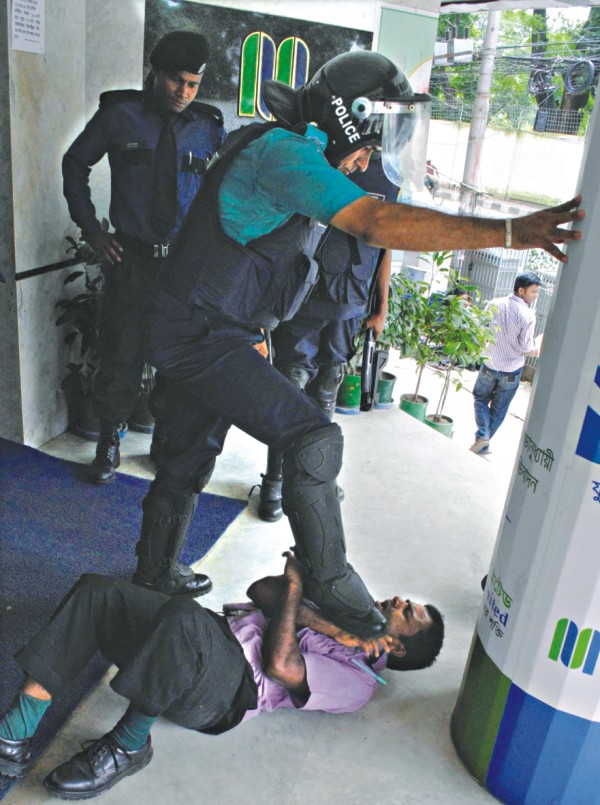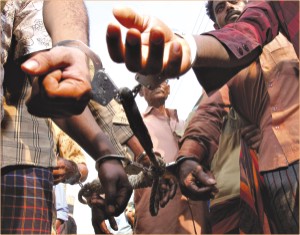 |
||||||||||||||||||||||||||||||||
| Volume 6 | Issue 07 | July 2012 | | ||||||||||||||||||||||||||||||||
Inside
|
The conundrum of police reform M LITON stresses the need for a vigorous reform in the police force to ensure its accountability.
The term 'police reform' has become a conundrum to the members of police since it has become a mix of different initiatives -- creating posts, procurements or launching new wings -- in the force but what actually the much-awaited reform needs is consciously avoided by successive governments lest the government should lose full control over it. The Police Act, 1861, designed for British India to quell indigenous movements or rebellions, which is still in place with little modification, subjects police to its colonial role, creating a series of negative impacts on independent citizens of Bangladesh. The prevalent colonial mindset among most police members is that they think they as police must be devoid of the feelings that locals possess and their main duty is to look after their employer's interests where humanity or ethics matter little. In colonial times, police had received an implied message that the lives, dignities and rights of indigenous people were so trivial that any sort of violation of law by police would not be taken into account unless such injustice causes mass protest. Police still continue with the similar practices as they at best get transferred, closed or suspended (though these are not punishment in any form) for their misdeeds rather than being tried in courts. And these also happen only when their misdeeds create news headlines or erupt violent protests by locals. The State Minister for Home Shamsul Haque Tuku was apt to say, “Keep safe distance from police”. Although he said it in a different context relating to journalists' security, it applies generally as well. For example, if a housewife had not gone to the Officer-in-Charge, Mamun-ur-Rashid of Terokhanda Police Station in Khulna for seeking help, she would not have been raped by him. The SP and other additional SP of Khulna were kind enough to take the conventional action against the OC by closing him to Khulna district police-line on June 10, instead of arresting him though they found him guilty in preliminary investigation. News reports surfaced that the housewife went to the OC's residence and requested him not to mention her husband's name in the charge sheet of a case over clash between two groups. A few minuites later, Mamun raped her. Examples of this kind are rife these days. At an earlier occasion the Federation of Bangladesh Chambers of Commerce and Industries (FBCCI) in presence of the state minister for home and the police chief came down hard on policemen who turn to crime but get away with it using political links. FBCCI leaders observed that the salary of constables is so poor that they resort to taking bribe, which is why the government should increase their salary. The state minister present there came up with a usual reply that they would take action after investigating the matter. However, very little has since happened and crimes in police continue to escalate in spite of frequent warnings from different rights bodies. And now that the government is nearly at the end of its tenure, no visible change has been noticed yet in police behaviour. It is now widely known that field level officers are loyal to their local political guardians instead of their departmental bosses as their wellbeing -- posting, promotion and backing for amassing wealth illegally -- depends on their political guardians. Consequently, posts of officers holding higher ranks turn almost ceremonial as they neither can take punitive measures nor can transfer their subordinates. On the other hand, it is the senior officials who at times have to follow juniors' advices, thus turning the chain of command back and eroding professionalism in the department.
The department knows where the problem lies and it tried and is still trying to put an end to it by bringing reform into the force. Many police officers, expressing their frustration, blame outside influence in the department that has almost damaged the chain of command in the force; and that works as a great obstacle to reform. They know if appointment, promotion, posting, punishment and transfer rest in the hands of influential quarters, especially ruling party men rather than proper authorities, the force can never be a pro-people one and cannot be free from corruption. To get the force free from the clutches of ruling party men, a draft of Bangladesh Police Ordinance was prepared in 2007. The drafting committee chairman was an ex-police chief while most of the members of the drafting committee were serving police high-ups who from their first hand experience gave input to the draft ordinance during the last nonpartisan caretaker government. However, the draft ordinance got entangled in the home ministry's red tape. The drafters, aiming to check promotion and posting with political consideration, suggested an independent National Police Commission (NPC) to recommend appointment of the police chief and posting of other high-ranking officials. According to the draft ordinance, there shall be a NPC comprising 11 members including two lawmakers from the treasury and two more from the opposition and be the ex-officio Chairperson. The proposed police commission will be tasked with recommending the government a short list of three police officers for appointment of the chief of police and other police officers. Out of that list made from amongst the five senior-most police officers holding appointments, the government will appoint a police officer not below the rank of inspector general of police as the chief of police. The government shall post police officers of the rank of additional inspector general of police as recommended by the NPC in consultation with the chief of police; and of the rank of deputy inspector general of police, additional deputy inspector general and senior superintendent or superintendent of police as recommended by the chief of police. The government, with the concurrence of NPC, may transfer or remove the chief of police from the post before the expiry of his tenure through a written order specifying reasons, consequent upon his a) voluntary application on personal ground, or b) conviction by a court of law in a criminal offence, or c) punishment of dismissal, removal, or compulsory retirement from service or of reduction to a lower post, awarded under the provision of the government servants (Discipline and Appeal) Rules 1985 or any other relevant rules. The proposed NPC in the draft ordinance clearly states how the chief of police and other officers be appointed and how they will be transferred, curtailing undue power exercised by influential quarters. Over the years the force are being treated as the tool of the government, giving it no scope to be the force of the state. Many officers of the department said no police officers -- from an assistant sub-inspector to above -- are transferred with consulting with the police chief and most officers have to pay handsome amount for getting transferred and even seniority is not maintained in promotion. While talking with The Daily Star on an occasion the state minister for home dismissed the move taken by the caretaker government of Fakhruddin Ahmed saying that the government is bringing about reform in the force by launching need-based units, procuring modern and sophisticated equipments for the force to combat terrorism, militancy and crimes. Several serving senior police officials said that the power to supervise police lies with the government but the extent to which it can be exercised should be clearly defined. Ruling party cadres often interfere with the routine police activities. The ruling party men often decide which cases should be recorded and who should be arrested or not. For the sensitivity of the reform issue, serving police officers dare not raise the issue of implementing the draft ordinance which also sought another commission -- police complaint commission to deal a series of actions like processing the complaint and referring the ordinary cases to an appropriate authority for action and reporting and in serious cases initiating action on its own. The police complaint commission has also a unique option that it may request the Chief Justice, in serious cases, to appoint a district and session judge for a judicial enquiry. At present victims of serious police crime often fail to have such a judicial enquiry despite serious efforts. This commission will create instinctive fear among personnel and work as deterrent to prevent them from breaking laws. In a country where political influence is ubiquitous, an independent commission such as this is the only alternative to ensuring accountability of the police force. Alongside this, a better pay scale and extensive training also seem integral to the reform process. M Liton is Staff Correspondent, The Daily Star.
|
|||||||||||||||||||||||||||||||

